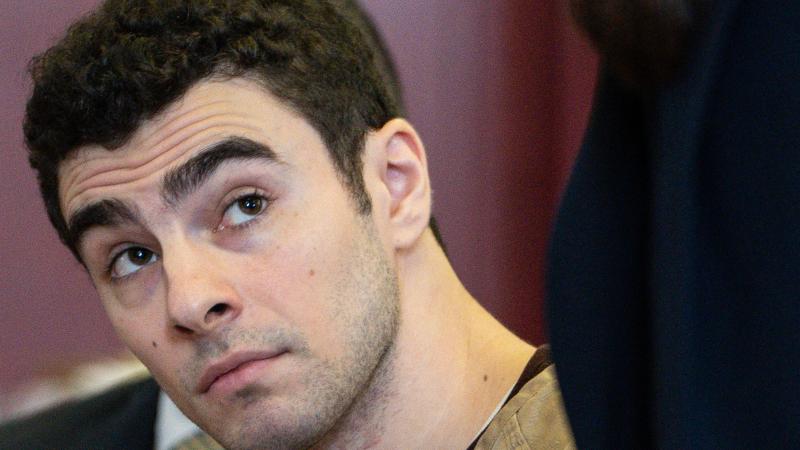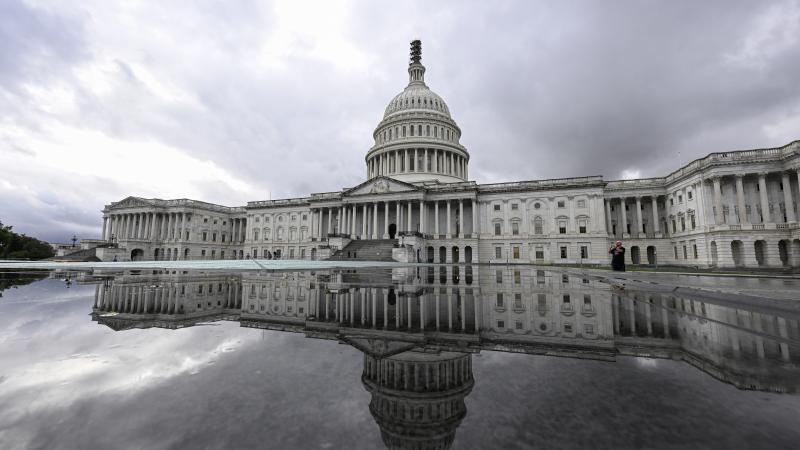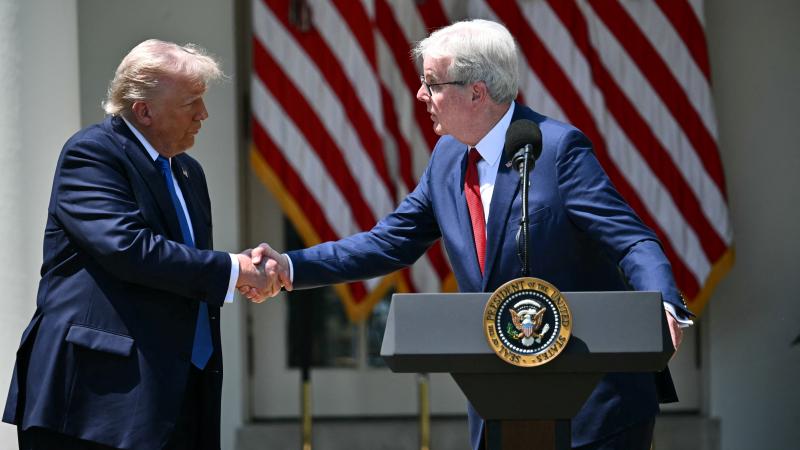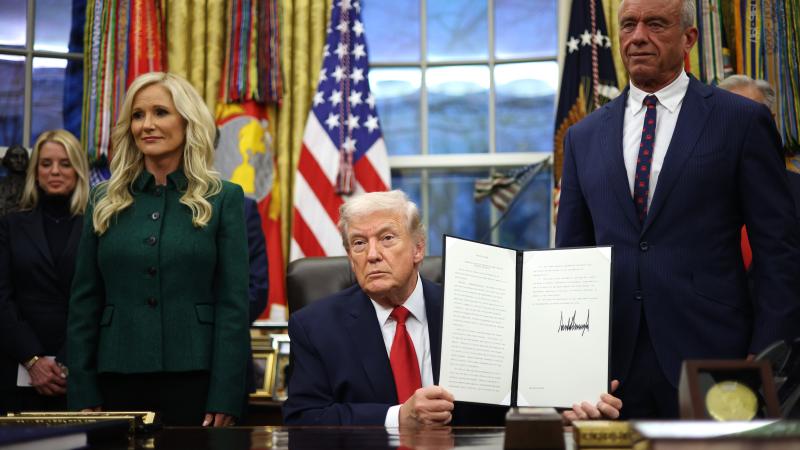Judges thwart Trump’s orders targeting Russiagate firms as Marc Elias takes victory lap
Donald Trump's efforts to target Big Law firms tied to the Trump-Russia collusion scandal have been repeatedly blocked by federal judges. Marc Elias is thrilled.
Federal district court judges have continued to thwart Trump’s executive orders targeting law firms tied to Russiagate, including the Perkins Coie law firm, which helped Hillary Clinton’s 2016 campaign fund British ex-spy Christopher Steele’s debunked anti-Trump dossier.
President Donald Trump issued his executive order on “Addressing Risks from Perkins Coie” in early March, but federal district court Judge Beryl Howell issued a temporary restraining order against Trump’s executive action from the bench later that month and then permanently blocked the entire executive order on Friday.
The president issued his executive order against Perkins Coie in large part for previously employing Marc Elias. Elias, who was the Clinton campaign's lawyer, helped Hillary Clinton’s 2016 presidential campaign push the bogus dossier.
Howell, named to the bench by then-President Barack Obama, issued her 102-page opinion on Friday, and permanently blocked the entirety of Trump’s executive order aimed at Perkins Coie.
Elias, who had hired the opposition research firm Fusion GPS which in turn hired Steele, took a victory lap this weekend, with a celebratory post on Bluesky and making a prominent appearance on CBS News' 60 Minutes.
Shakespeare and "eliminating lawyers"
“No American President has ever before issued executive orders like the one at issue in this lawsuit targeting a prominent law firm with adverse actions to be executed by all Executive branch agencies," Howell wrote, "but, in purpose and effect, this action draws from a playbook as old as Shakespeare, who penned the phrase: ‘The first thing we do, let’s kill all the lawyers.’ When Shakespeare’s character, a rebel leader intent on becoming king, hears this suggestion, he promptly incorporates this tactic as part of his plan to assume power," she continued.
"Eliminating lawyers as the guardians of the rule of law removes a major impediment to the path to more power,” Howell added. Howell's "kill all the lawyers" reference was to a passage from Shakespeare’s Henry VI, where a rebel suggests killing loyalist lawyers as part of their plot to overthrow King Henry.
Elias bragged about the ruling in a post on his Democracy Docket website on Monday, saying, “[T]his has been an emotional weekend for me personally. I have no doubt that Trump’s hateful words are not behind me. I am certain he will escalate his campaign of political retribution. But, for my part, I will not stop fighting. I will never back down.”
Trump has often used harsh language in multiple executive orders, here, addressing the "significant risks” posed by the “Big Law” firms who “engage in conduct detrimental to critical American interests,” but has never suggested killing lawyers.
Perkins Coie is not the only firm targeted by Trump's executive orders. On March 27, he also issued executive orders restricting governmental interaction with WilmerHale, a D.C. powerhouse in the political arena, for, among other things, previously employing special counsel Robert Mueller and two of his top prosecutors, and against Jenner & Block, in part for previously employing top Mueller prosecutor Andrew Weissmann.
Trump v. "Big Law" not exactly "David and Goliath"
WilmerHale employs more than 1,100 lawyers, and Jenner & Block employs more than 500 lawyers globally, according to their respective company websites. Bloomberg Law reported that WilmerHale's 2024 revenues passed the $1.6 billion mark in 2024, and Jenner & Block nabbed $682.16 million in 2024 revenue, with each equity partner averaging a paycheck of $2.84 million, according to its website.
By way of comparison, the Department of Justice pays Assistant U.S. Attorneys — the men and women who spend their working days putting criminals behind bars — a maximum of $165,209 a year, and that's only for those who stay on the job for more than nine years.
Other judges have blocked significant portions of Trump’s executive orders aimed at each of those "white-shoe" firms too, although the Paul Weiss law firm — which had been targeted by Trump in part for employing former Mueller prosecutor Jeannie Rhee — acquiesced to Trump’s demands. Other large firms, like Willkie, Farr & Gallagher, who employs Doug Emhoff, the husband of failed candidate Kamala Harris, have also agreed to cooperate with Trump's demands.
It remains to be seen whether the other district court judges overseeing the lawsuits brought by WilmerHale and Jenner & Block will follow Judge Howell’s lead in eviscerating Trump’s executive orders.
Election integrity issues were the legal basis for executive orders in play
Howell’s Friday ruling sought to disregard Trump’s efforts to target Perkins Coie for having previously employed Marc Elias, who had hired Fusion GPS and was tied to the Steele dossier.
Howell cited a September 2023 Truth Social post where Trump said: “They spied on my Campaign, Impeached me twice, had the Russia, Russia Hoax, the Fake Dossier Hoax, FISA Fraud, Election Fraud, the ‘No Collusion’ Mueller Hoax, and so much more. I was innocent on all counts. If I am elected, they will be brought to JUSTICE, something that Republicans have always been afraid to do.”
The judge argued that “the reference to the ‘Fake Dossier Hoax’ in this litany of perceived wrong-doing alludes to plaintiff’s work representing President Trump’s 2016 political opponent and thus obliquely identifies plaintiff as one of the targets to be ‘brought to JUSTICE’ upon President Trump’s election to his current office.”
The Justice Department had filed a motion to dismiss the lawsuit on April 2 brought by Perkins Coie, and the DOJ unsuccessfully renewed its motion to dismiss on April 30.
“The Executive Order lays out the President’s concerns about the law firm Perkins Coie LLP in matters related to election integrity, national security, and discriminatory employment practices," the DOJ said in their filings.
"In light of those considerations, the Executive Order directs a review of Perkins Coie to ensure that the Federal Government’s dealings with the firm are consistent with the national security of the United States and other public interests,” the DOJ further said in its unsuccessful effort to dismiss the complaint. “And it seeks to ensure that taxpayer funds are not in any way diverted to support unlawful or unsavory practices that — if they should be permitted at all — must be financed by the private dime.”
The DOJ said that “Plaintiff’s 172-paragraph complaint raising nine separate legal claims only obscures what is a straightforward — and straightforwardly legal — Executive Order.” The DOJ attorneys added that Perkins Coie even admitted in their filings that Perkins Coie hired Fusion GPS, that Fusion GPS was involved in creating the fake dossier, and that the dossier was designed to interfere with the 2016 election.
“The entire Steele dossier debacle involved multiple falsehoods related to the matter as laid out in the report by the Special Counsel John Durham,” the DOJ argued in its motion to dismiss. “The Durham Report references Perkins Coie over forty times and details its role — acting as counsel to the Clinton campaign and procuring and distributing the now-debunked ‘Steele Dossier.’ … As that report indicates, the review contemplated by … the Executive Order is based on undisputed fact — not falsehood, and certainly not knowing falsehood.”
Perkins Coie had filed its opposition to DOJ’s motion to dismiss on April 16, with the lawyers for Perkins Coie arguing that the “categorical suspension [of security clearances] itself indicates a retaliatory intent” and that “any ‘national security’ concern is mere pretext.”
Elias had already left Perkins Coie, taking them off the hook
Perkins Coie's lawyers convinced Howell that the executive order’s section on security clearances “does not even target the lawyers who retained Fusion GPS; they no longer work at the Firm” and that “the Order punishes current Firm personnel who had no involvement with that episode based on nothing more than guilt by association.”
The lawyers for Perkins Coie also said that the suspension of security clearances is “oddly timed” because “the 2016 dossier did not cause the President to revoke the clearances of Firm personnel during his first term.”
“To the extent the government argues the security clearance directives were motivated by alleged national security concerns stemming from contacts with Fusion GPS in 2016, plaintiff has no current employee who was involved in that engagement, and none of the attorneys involved have been employed by plaintiff for at least three years,” Howell said in her Friday ruling. “The government cannot credibly claim that targeting plaintiff’s current employees would remedy any national security concerns related to Fusion GPS when none of those employees were involved with Fusion GPS.”
“The government’s contention … that the Firm’s representation of Mrs. Clinton and clients in election litigation ‘is not ‘protected’ in any meaningful sense’ because Special Counsel Durham investigated the Steele dossier is baffling,” Perkins Coie claimed. “The mere fact of an investigation does not rob speech of constitutional protection—least of all the Durham investigation, which led to the acquittal of a former Firm partner.”
Pekins Coie’s motion for summary judgment — part of its effort to permanently block the Trump executive order — was filed on April 30.
Lawyers for Perkins Coie said their client “respectfully requests” that the judge declare that Trump’s executive order “is unlawful because it violates the First, Fifth, and Sixth Amendments to the U.S. Constitution, exceeds the President’s constitutional authority under Article II, and violates the separation of powers” — and that the judge “permanently” block the Trump administration from “implementing or enforcing” the order.
Howell’s May 2 ruling soon found that Trump’s executive order “is unlawful because it violates the First, Fifth, and Sixth Amendments to the U.S. Constitution and is therefore null and void.” The result of the ruling is the temporary restraining order against the executive order is now permanent, unless and until it is reviewed by the Circuit Court of Appeals for the District of Columbia.
Marc Elias and his 60 Minutes victory lap
The 60 Minutes segment which aired on Sunday was filmed prior to Howell’s Friday ruling, but the segment ended up being something of a victory lap for Marc Elias.
60 Minutes correspondent Scott Pelley featured Elias favorably in a lengthy segment attacking Trump’s executive orders against "Big Law" firms, yet neither Pelley nor the CBS News program ever detailed to viewers Elias’s role in hiring Fusion GPS and in pushing Steele's disinformation and other collusion claims, despite being the key reason why Perkins Coie and Elias were targeted by Trump's executive orders.
Elias wrote on Monday on his Democracy Docket website that “I agreed to talk to 60 Minutes, and I promised myself I would not pull punches. … As the minutes ticked by, it became clear that 60 Minutes had pulled no punches. Through interviews with me and others, Pelley painted a damning picture of a president out for retribution and a legal industry too cowardly to stand up to him.”
Democracy Docket is a left-wing news platform based on a paid subscription model, and boasts of having 400,000 subscribers. A subscription costs $120 a year, giving his Democracy Docket LLC an estimated revenue of $48 million a year. The actual corporate structure of the LLC is somewhat obscure, and election watchers have noted its interlocked connections with the Democracy Docket Action Fund and The North Fund, described by Influence Watch as "a left-of-center nonprofit based in Washington, D.C. and part of the multi-billion-dollar nonprofit network created and administered by Arabella Advisors. North Fund is particularly close to the Arabella-run 501(c)(4) group Sixteen Thirty Fund."
Elias had shared Howell’s ruling with a blaring red siren post on Bluesky on Friday, saying, “Federal Court permanently BLOCKS Trump executive order targeting my former law firm, Perkins Coie.”
Elias then shared the 60 Minutes segment on social media on Sunday, saying, “I may be the only lawyer targeted by Trump willing to speak on camera, but for me it wasn't a choice. All of us have an obligation to speak out against what Trump is doing. All of us have an obligation to fight for democracy. I am fortunate to be a lawyer and to have a platform — and I will use it.”
The 60 Minutes segment voice-over said that “many firms and attorneys have been targeted, among them Marc Elias, a long-time opponent of Trump who is the only lawyer the president has named who was willing to appear on 60 Minutes. Elias, and others, are warning that Trump's assault on the legal profession threatens the rule of law itself. Elias says that for him, it began with the president's personal grudge.”
The fact that the alleged “personal grudge” involved Fusion GPS and the oft-repeated disinformation of the Steele dossier was never mentioned.
“Donald Trump hates me because I fight hard, and I fight for free and fair elections. I insist on fighting for democracy in court, fighting for voting rights in court, and insist on telling the truth about what the outcome of the 2020 election was,” Elias claimed to Pelley.
The 60 Minutes voice-over said that “Marc Elias first crossed Trump in 2016. He was the top lawyer for the Clinton campaign. Then, in 2020, when Trump and allies challenged the election results, Elias fought in court and won. Trump calls him a thug.”
Again, CBS failed to mention Fusion GPS or the fake dossier.
Trump: "They're not babies"
The segment on 60 Minutes also played comments by Trump to reporters in late March, where the president said, “Well, the law firms all want to make deals. You mean the law firms that we're going after, that went after me for four years, ruthlessly, violently, illegally? Are those the law firms you're talking about? They're not babies. They're very sophisticated people. Those law firms did bad things, bad things. They went after me for years. Russia, Russia, Russia hoax — all a hoax.”
The 60 Minutes voice-over claimed: “What Trump means by ‘a hoax’ were allegations in 2016 of shady dealings with Russia by Trump and his campaign. He's right that the FBI ‘could not corroborate’ what was described as ‘rumor.’ At least one allegation was ‘promote[d] to the media…’ by Clinton campaign representatives when Marc Elias was general counsel.”
Despite CBS's vague reference to the fake dossier, there were no specific details mentioned regarding Elias’s key role in hiring Fusion GPS or in helping with the funding and creation of the anti-Trump disinformation campaign they waged.
Trump issued a March 22 executive order on “Preventing Abuses of the Legal System and the Federal Court” — where he singled out Elias.
Sins of omission?
Elias wrote a lengthy post on Monday, where he detailed his battles against Trump since 2016 — never mentioning or even hinting at his role in hiring Fusion GPS and funding the Steele dossier.
“I have been fighting Donald Trump nonstop for a decade,” Elias wrote. “People often forget that in 2016, Trump and his campaign were fixated on undermining free and fair elections. I was equally determined to protect them. That year, I led litigation efforts in several battleground states aimed at defending voting rights. Our efforts were in vain. While we won some of the lawsuits, we lost the election.”
Elias added that “the latest development in this saga took place late on Friday, when a federal judge permanently blocked Trump’s executive order seeking to punish my former law firm for my work while I was a partner there.”
Despite the law firm’s role in generating the Steele Dossier, which was repeatedly front-and-center during court filings by the DOJ and the lawyers for Perkins Coie, Elias did not acknowledge that Special Counsel Durham’s report concluded that “the FBI ignored the fact that at no time before, during, or after Crossfire Hurricane were investigators able to corroborate a single substantive allegation in the Steele dossier reporting.”
“Lawyers and law firms that engage in actions that violate the laws of the United States or rules governing attorney conduct must be efficiently and effectively held accountable,” Trump wrote.
He added that “Recent examples of grossly unethical misconduct are far too common. For instance, in 2016, Marc Elias, founder and chair of Elias Law Group LLP, was deeply involved in the creation of a false ‘dossier’ by a foreign national designed to provide a fraudulent basis for Federal law enforcement to investigate a Presidential candidate in order to alter the outcome of the Presidential election. Elias also intentionally sought to conceal the role of his client — failed Presidential candidate Hillary Clinton — in the dossier.”
Other judges may follow Howell’s line of reasoning
The DOJ had unsuccessfully argued in a March 21 filing that Howell should recuse herself from the case because “this Court has repeatedly demonstrated partiality against and animus towards the President.”
Howell refused to recuse herself in a March 26 ruling, saying that “this strategy is designed to impugn the integrity of the federal judicial system and blame any loss on the decision-maker rather than fallacies in the substantive legal arguments presented.”
Trump later called Howell an “unmitigated train wreck” on Truth Social in late April, arguing that “it’s called Trump Derangement Syndrome, and she’s got a bad case of it.” Trump said in the post that he was targeting “Perkins Coie for their egregious and unlawful acts, in particular the conduct of a specific member of this firm, only to find out that the Judge assigned to this case is Beryl Howell, an Obama appointment, and a highly biased and unfair disaster.”
Judicial Watch president Tom Fitton referred to Howell’s Friday ruling as a “JUDICIAL COUP” and tweeted that an “anti-Trump judge in DC orders @RealDonaldTrump admin to maintain security clearances for Clinton campaign law firm that knowingly pushed a fake Russia hoax to try to steal the 2016 election.”
Trump’s executive order targeting Perkins Coie has faced some criticism from the right as well.
Andrew McCarthy, a former federal prosecutor in the Southern District of New York and a contributing editor at National Review, called Trump’s order a “brazenly unconstitutional attempt to put the law firm out of business.” He added this weekend that “Judge Howell’s ruling is sure to influence other judges now considering President Trump’s EOs.” Trump’s other executive orders have targeted firms that hired Mueller and his deputies — and the precedent may now be set for other judges to make permanent the injunctions against the executive orders.
Part of the "Resistance" strategy of lawfare, a specialty of Elias', is to search the nation for left-leaning or outright sympathetic district court judges willing to enjoin Republican policy actions, win, lose, or draw, as long as it makes their point heard and costs their opposition time and money.
In a related development, Senator Chuck Grassley, R-Iowa, told John Solomon Reports in early May that he was focusing on reining in activist federal judges who issue national injunctions.
DOJ: WilmerHale rewards Robert Mueller
Just as Perkins Coie was being held accountable for Elias' activities injecting disinformation and outright falsehoods into the body politic, Trump’s executive order on “Addressing Risks from WilmerHale” was issued on March 27, and included a heavy focus on Mueller and members of his team.
Mueller had worked at WilmerHale after his time as FBI director, and returned there as a partner after his time as Special Counsel. Mueller prosecutor James Quarles, mentioned in Trump’s executive order as well, is now a retired partner at the firm, while Mueller deputy Aaron Zebley, also mentioned in Trump’s executive order, remains a partner there.
Lawyers for WilmerHale filed a complaint and a request for a temporary restraining order in late March.
Judge Richard Leon, who was appointed by President George W. Bush, granted the firm a partial temporary restraining order on March 28, letting the revocation of security clearances stand for now, but blocking Trump’s efforts to cut government contracts tied to the firm and his efforts to block the firm from federal buildings.
On April 8, the DOJ lodged a motion to dismiss WilmerHale’s lawsuit. “As to the Plaintiff’s connections to the Mueller investigation, it is the President’s right to question Plaintiff’s judgment considering the serious questions about the propriety of the Mueller investigation and the charges levied against the President himself,” the DOJ told the District of Columbia's federal court.
The DOJ also argued that “the Executive Order is not a punishment or a sanction; no one is punished when he does not have discretionary security clearance, and no one is sanctioned when he simply is not provided a government grant under a contract.”
WilmerHale’s lawyers filed a motion for summary judgment on April 8 in an effort to convince the judge to make permanent the block on Trump’s executive order. “The Order also explicitly targets WilmerHale based on the speech and viewpoints of Mr. Mueller and those who assisted him, and based on WilmerHale’s association with them and its own speech about their public service,” the lawyers for WilmerHale contended.
“While the President may disagree with Mr. Mueller’s decision to accept the invitation (by President Trump’s own Justice Department) to serve as Special Counsel, the viewpoints expressed in his report, or WilmerHale’s decision to welcome him back after his service, the President may not penalize the Firm based on its association with Mr. Mueller and his (real or perceived) viewpoints,” WilmerHale’s lawyers told the court in pleadings.
The DOJ filed its opposition to WilmerHale’s motion on April 17, arguing that “there is no First Amendment right to silence the Government” and that “crediting Plaintiff’s argument carries with it a dangerous risk of the Judiciary muzzling First Amendment protected Executive speech.”
The DOJ noted that Trump’s executive order said that “WilmerHale was the law firm that ‘welcomed’ and ‘rewarded’ Robert Mueller, whose ‘investigation epitomized the weaponization of government’ that ‘upended the lives of public servants’ and ‘interfere[ed] with their ability to fulfill the mandates’ of President Trump’s first term agenda” and DOJ argued that “these statements are not seriously contested and are matters of public record.”
DOJ lawyers argued that “the Executive Order directs agencies to do what they should already be doing, declines to contract with entities who act inconsistently with valid social policies regarding discrimination, and calls for the lawful examination of security clearances and government access of employees of Plaintiff’s firm.”
WilmerHale’s opposition to DOJ’s motion to dismiss contended that Trump’s executive order “targets WilmerHale based on the speech and presumed viewpoints of a former partner, Robert Mueller, and on WilmerHale’s own characterization of Mr. Mueller’s public service.” The lawyers for WilmerHale argued that the Trump administration’s “narrative is belied by the President’s candid explanation for why he imposed sanctions on WilmerHale: its choice of clients and cases and its affiliation with people the President dislikes.”
That case is still under review, and although the fact pattern varies from the case involving Elias and Perkins Coie, whether Judge Leon follows Judge Howell’s lead and permanently blocks the entire executive order remains to be seen.
Jenner & Block, Weissmann, weaponization, and retaliation
Trump issued his executive order on “Addressing Risks from Jenner & Block” on March 25, with a notable focus on top Mueller prosecutor Andrew Weissmann, who was twice hired by the firm.
Quoting Jenner & Block, the executive order noted that “Jenner was ‘thrilled’ to re-hire the unethical Andrew Weissmann after his time engaging in partisan prosecution as part of Robert Mueller’s entirely unjustified investigation,” the executive order said. “Andrew Weissmann’s career has been rooted in weaponized government and abuse of power […] The numerous reports of Weissmann’s dishonesty, including pursuit of nonexistent crimes, bribery to foreign nationals, and overt demand that the Federal Government pursue a political agenda against me, is a concerning indictment of Jenner’s values and priorities.”
Lawyers for Jenner quickly filed a lawsuit and a request for an emergency hearing on a temporary restraining order on March 28, arguing that Trump’s executive order “is an unconstitutional abuse of power against lawyers, their clients, and the legal system” and “is intended to coerce law firms and lawyers into renouncing the Administration’s critics and ceasing certain representations adverse to the government.” Similar to the arguments made by Perkins Coie regarding Elias, Jenner's lawyers added that Weissmann “has not been employed by Jenner since 2021.”
On March 28, Judge John D. Bates, a George W. Bush appointee, granted the firm’s request in part, allowing the limitations on security clearances to remain in place for the time being. At the same time, the ruling reversed Trump’s other limitations on the firm and enjoined the DOJ from using the statements in the "background" section of the executive order "in any interactions with Plaintiff or Plaintiffs clients, or employee of Plaintiff or Plaintiffs clients."
The Justice Department filed a motion to dismiss Jenner’s lawsuit on April 8. In those pleadings, the DOJ told the court that: “As to Weissmann, Plaintiff tries to minimize any association with him, on the theory that ‘Mr. Weissmann has not performed legal work for Jenner & Block in roughly four years [...] But Plaintiff’s attempts to distance itself from Weissman or his investigation of the President are revisionist history.”
DOJ lawyers also said that “shortly before Mr. Weissman’s departure from the firm, Jenner & Block hosted an event interviewing him” and noted that Jenner’s website said the November 2020 discussion would “offer unique insight on the [Mueller] investigation’s history-making search for the truth, the team’s painstaking challenges, and the unprecedented efforts by President Trump and Attorney General Barr to stifle their mission.”
“Jenner & Block publicly praised Weissmann’s role in the Mueller investigation, and backed up that praise by rehiring him,” the DOJ said. “Such words may be Jenner & Block’s right," the DOJ said, "But it is also the President’s right to question Jenner & Block’s judgment in this matter, considering the serious questions about the propriety of the Mueller investigation and the charges Jenner & Block’s own lawyer levied against the President himself.”
Jenner makes First Amendment claims
In response to the March 25, 2025, executive order, Jenner’s lawyers filed a motion for summary judgment on April 8 as they asked the judge to permanently stop the executive order from being enforced.
“Mr. Weissmann’s speech and the expressive association between Jenner and Mr. Weissmann, which supposedly cast doubt on Jenner’s ‘values and priorities’ … is protected by the First Amendment,” Jenner's lawyers argued, citing earlier Supreme Court precedent.
On April 17, Jenner’s lawyers filed papers opposing the DOJ's April 8 motion to dismiss Jenner's claims, contending that Trump’s executive order “is textbook retaliation for textbook political speech and association” and that “these statements” by Trump “make crystal clear that Jenner is being targeted for its representations in court of disfavored entities and positions, and its associations with disfavored individuals.”
“The Order also retaliates against Jenner based on the constitutionally protected speech of a former Jenner partner. Mr. Weissmann has exercised his First Amendment right to criticize the President, including in a book and as a commentator,” the lawyers for Jenner argued. “The Order also imputes Mr. Weissmann’s viewpoint to Jenner, and then targets Jenner because he was a former partner of the Firm, which purportedly casts doubt on Jenner’s ‘values.’ Put another way, the Order concludes that Jenner has the wrong ‘values’ because it has the wrong (imputed) viewpoint. This is patently unconstitutional viewpoint discrimination.”
The DOJ filed an opposition to Jenner’s motion for summary judgment on April 17. “Plaintiff asks the Court to hold, as a matter of law, that the EO, which directs a review of Jenner to ensure that the Federal Government’s dealings with it are consistent with the national security of the United States and other public interests, is unconstitutional on its face and will cause Jenner grievous harm, both financial and otherwise, if implemented,” the Justice Department said.
“However," the DOJ's pleadings continued, "neither the law nor the facts warrant drawing such a conclusion. The law makes plain that the terms of the EO are well within the scope of Presidential prerogative.”
The DOJ also argued that “Plaintiff’s claim of a lack of any national security nexus is plainly belied by the firm’s public praise for Andrew Weissmann’s role in the Mueller investigation, which followed the firm rehiring him.”
A hearing on the motion for a preliminary injunction and for the motion to dismiss was held on April 28 and is still sub judice, meaning under review.
It remains to be seen if Judge Bates will permanently block Trump’s executive order as Judge Howell did. But, so far, Trump is not having much luck holding these firms accountable.
To appeal or not to appeal, that is the question
The White House did not respond to Just the News' inquiries about plans to appeal. Normally, the Federal Rules of Civil Procedure allow an appellant — in this case the Trump DOJ — 60 days to file a "notice of appeal." That filing is not a legal argument, but instead simply preserves the DOJ's right to make its case to a three-judge panel of the Court of Appeals that oversees the district court.
As of the publication date, a search of the federal dockets in the Jenner, Perkins Coie, and WilmerHale cases does not show any filings by the DOJ regarding an appeal. In addition, despite the 60-day window for filing a notice of appeal and the long, drawn-out process that appeals usually entail, the rules do allow a party to file an "emergency appeal" in order to quickly obtain a "stay pending review."
That further complicates any speculation about what the DOJ may do, and when they would do it. But given Trump's penchant for fighting back, there's plenty of time for him to try to make his case again, or in the alternative, move on to other pressing matters.
The Facts Inside Our Reporter's Notebook
Links
- executive order
- temporary restraining order
- permanently blocked
- Perkins Coie
- issued her 102-page opinion
- celebratory post
- prominent appearance
- referencing a passage
- multiple
- executive
- orders
- blocked significant portions
- targeted by Trump
- Truth Social post
- filed a motion to dismiss
- renewed its motion to dismiss
- opposition to DOJ's motion to dismiss
- motion for summary judgment
- ruling soon found
- 60 Minutes segment which aired on Sunday
- blaring red siren post
- shared
- played comments
- according to a congressional report
- notorious
- report
- concluded
- role in generating
- the Steele Dossier
- executive order
- arguing
- Steele Dossier
- John Durham's special counsel investigation.
- special counsel inquiry
- argued
- refused to recuse
- Truth Social
- tweeted
- called
- did not establish
- Trump-Russia collusion.
- central and essential
- FBI's politicized surveillance
- executive order
- after his time
- returned there
- complaint
- request
- appointed
- granted
- motion
- to dismiss
- motion
- for summary judgment
- filed its opposition
- opposition to DOJ's motion to dismiss
- filed a motion
- executive order
- lawsuit
- request for a temporary restraining order
- appointed
- granted
- sought
- to dismiss
- website
- opposition to DOJ's motion to dismiss
- filed
- motion for summary judgment
- DOJ's opposition
- Federal Rules of Civil Procedure
- "stay pending review"













